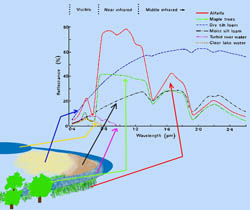The proportions of energy
reflected, absorbed, and transmitted will vary for different earth features.
These differences permit us to distinguish different features on an image.
Surface types such as water, bare ground or vegetation, reflect radiation
differently. In this way, the composition of the electromagnetic reflection,
the spectral signature, tells us about the surface emitting or reflecting
the radiation.
Spectral
reflectance curves for two types of green vegetation, light and dark soils,
and clear and turbid water. Using different type of sensors (observing at
different wave length), it is possible to distinguish one object from the
other one.
The
curves of the spectral signature indicate how much energy may be reflected from
the surface in question, and subsequently recorded by a remote sensing instrument.
At a given wavelength, the higher the reflectance, the brighter the object appears
in an image. Note from the figure above that vegetation will reflect more raditation
in the infrared wavelengths.
